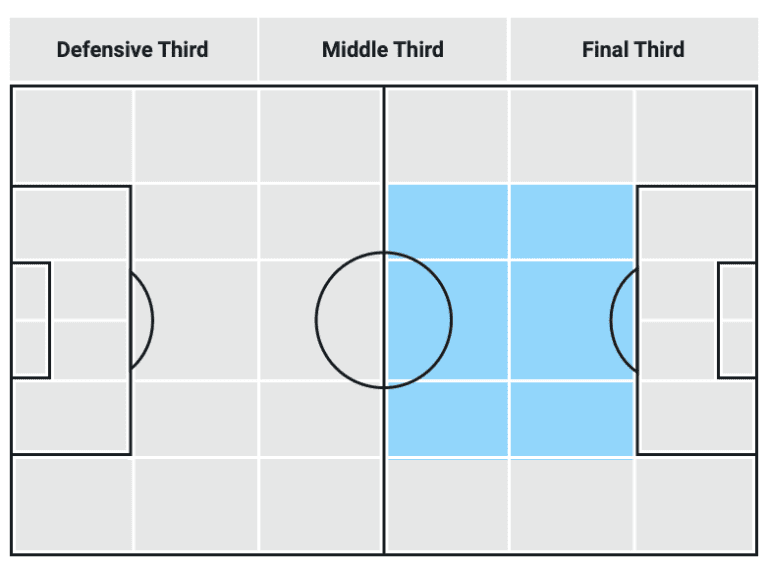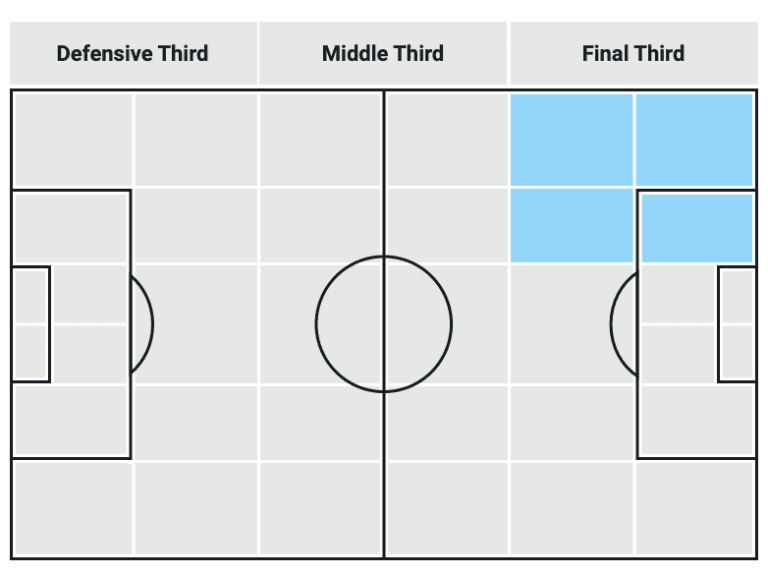Teams are putting together their last few training sessions. Players are close to returning from international duty to rejoin their teammates. Gerhard Struber has almost finished subtly replacing all of New Jersey’s Gatorade with various flavors of Red Bull.
It’s Audi MLS Cup Playoffs time, baby.
Round One starts Saturday and continues through Tuesday with six games on the docket. With the postseason breathing down our necks, this week’s column is all about playoff X-factors. Using Second Spectrum’s data, we’re going to dive into all six Round One matchups to look at a key player who could make a dramatic impact on each game’s proceedings.
Let’s get started, shall we?
Jim Curtin’s Union and Struber’s Red Bulls have two of the stingiest defenses in MLS. During the regular season, Philadelphia allowed the third-fewest amount of open-play xG while the Red Bulls allowed the second-fewest. Their numbers are similar, but there's a clear difference in how these two teams approach defending. RBNY press more than any other team in MLS – their 16.1 high-presses per game is most in the league and close to double the Union’s 8.9 high-presses per game.
Though this game will be played at Subaru Park, it’s reasonable to expect the Red Bulls to bring their up-tempo, high-pressing style with them to Chester. That’s where Jakob Glesnes comes in. Glesnes is an asset driving the ball forward from the back. He’s fourth among center backs in average opponents bypassed per touch during the buildup and is third in average forward distance traveled per touch.
With Red Bull players flying at him when the Union have the ball, Glesnes will have the opportunity to leverage his comfort on the ball into dangerous attacks for his team. Glesnes’ effectiveness (or lack thereof) in possession on Saturday could help decide the outcome.
The Whitecaps don’t care too much about having the ball. Sporting Kansas City care very much about having the ball. That’s one of the biggest – if not the biggest – tactical contrasts in this game. SKC’s 55% possession was second in MLS in the regular season, while Vancouver’s 46.1% put them 24th. In the last meeting between these two teams on October 17, SKC collected 64% possession, leaving just 36% for the Caps.
Because of that giant difference in offensive principles, it follows that we’re going to see Kansas City control the ball again on Saturday at Children's Mercy Park. However, as the historic soccer proverb goes, having possession does not a game win.
One player who could cause Peter Vermes and Co. some serious issues in transition is Ryan Gauld. Since getting his first minutes for Vancouver in early August, Gauld has been a top-tier playmaker in MLS. The Scotsman's in the 89th percentile in the league in terms of xA per 90 minutes and is in the 85th percentile among attacking midfielders and wingers in terms of his progressive passing frequency.
If SKC shut Gauld down, the Whitecaps could have trouble getting into the game. But if the left-footed playmaker can get out and run, Vanni Sartini’s team might be in business.
For starters, I want to be clear: I don’t know if Gonzalo Pineda will start Franco Ibarra against NYCFC on Sunday. There are several central midfield combinations Pineda could choose, some that include Ibarra and others that don’t. With that disclaimer out of the way, I’d like to point out it might be a good idea to start Ibarra at Yankee Stadium.
Only two teams create more shots from these highlighted zones than Ronny Deila’s NYCFC team.

If I’m Pineda, I want my most aggressive, defensively inclined central midfielder involved in this game to make it more challenging for NYCFC to create chances from those central areas. On a per 90 minute basis, Ibarra's in the 92nd percentile among MLS players in terms of tackles won. He’s also in the 80th percentile among midfielders in terms of pressing efficiency.
Ibarra isn’t a particularly adventurous passer, but his defensive chops make him an X-Factor in this game.
Portland vs. Minnesota could be a case study for why set pieces are crucial. Gio Savarese’s Timbers are the worst team in MLS when it comes to defending free kicks and corner kicks: they allowed 12.5 total xG (the most in MLS) and an average of 0.18 xG (the most in MLS) from those two dead-ball situations during the regular season.
Minnesota United, for their part, are dangerous on offensive set pieces. They're fifth in the league in total xG created from free kicks and corner kicks and ninth in average xG in those same dead ball situations, largely due to Emanuel Reynoso’s skill.
Keeping that set-piece quality disparity in mind, Portland goalkeeper Steve Clark may need to be in full shot-stopping mode come Sunday’s game. Fortunately for the Timbers, Clark has been an excellent shot-stopper in 2021. According to American Soccer Analysis, Clark is fifth among goalkeepers in goals minus expected goals with -3.42, which means he allows fewer goals than expected.
If Portland don’t take more care while defending set pieces, Clark may be called upon to make some big saves in Round One.
Can anyone break through Nashville SC? That’s one of the biggest questions of this year’s postseason. No team in MLS allowed fewer expected goals than Nashville and only one team allowed fewer actual open-play goals than Nashville this season.
Because of how solid Nashville are in the back, it will be extremely challenging for Orlando to break them down. But if there’s one point of encouragement for Oscar Pareja, it’s that there's a weak point in their opponents’ defensive shape (at least relative to the rest of Nashville’s defensive numbers). Nashville allow the 14th most passes that lead to a shot from these four zones in the entire league (in this case, the final third is Nashville’s defensive third):

Enter left back Emmanuel Mas. Mas hasn’t been a real standout since moving to Orlando from Boca Juniors in July, but the stage could be set for him to have an outsized impact on this particular game. If Nani starts on the left wing, he will naturally draw attention from Nashville’s right side. Mas, who can string together some progressive passes, could then provide the finishing touches on various attacking moves and help create shooting opportunities from the (slightly) vulnerable portion of Nashville’s defensive shape.
Keep an eye on Joao Moutinho's status and availability here, too.
To set the scene for this X-factor, I want to borrow a line from a piece I wrote last week:
From August 27, to the end of the regular season, only three teams have given up more open-play xG and only two teams have given up more open-play goals than RSL.
Under Pablo Mastroeni, Real Salt Lake play open soccer. That’s good news for the Sounders and especially good news for Cristian Roldan, who thrives in open games. No Seattle attacker has more touches against a transitioning defense than Roldan – and no Seattle player has more touches in the final third against a transitioning defense than Roldan.
Roldan, who will have a chance to settle back into Seattle after traveling on international duty with the United States, is one of the most active runners in MLS. His 9.9 runs per game put him in the 90th percentile and his 1.7 “pass and move” runs per game put him in the 94th percentile. On top of all his movement, Roldan is in the 96th percentile in MLS in xA.
For Real Salt Lake, adding a pinch of defensive solidity to deal with Roldan’s energetic creativity will be key. And on Seattle's side of this matchup, after struggling to create consistent, quality attacking chances for stretches of the regular season, taking full advantage of Roldan’s skillset will be critical.


















